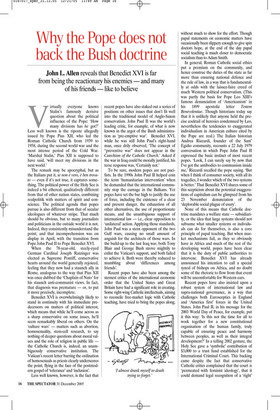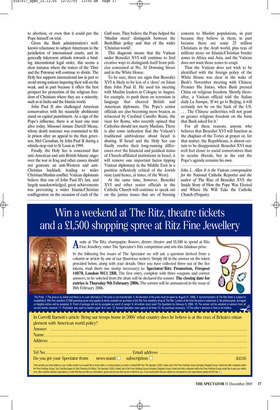Why the Pope does not back the Bush doctrine
John L. Allen reveals that Benedict XVI is far from being the reactionary his enemies — and many of his friends — like to believe Virtually everyone knows Stalin’s famously derisive question about the political influence of the Pope: ‘How many divisions has he got?’ Less well known is the riposte allegedly issued by Pope Pius XII, who led the Roman Catholic Church from 1939 to 1958, during the second world war and the most intense period of the Cold War. ‘Marshal Stalin,’ Pius XII is supposed to have said, ‘will meet my divisions in the next world.’ The remark may be apocryphal, but as the Italians put it, se non è vero, è ben trovato — even if it’s not true, it captures something. The political power of the Holy See is indeed a bit ethereal, qualitatively different from that of other nation states, combining realpolitik with matters of spirit and conscience. The political agenda that popes pursue is also different from that of secular ideologues of whatever stripe. That much should be obvious, but to many journalists and politicians in the outside world it is not. Indeed, they consistently misunderstand the point; and that incomprehension was on display in April, with the transition from Pope John Paul II to Pope Benedict XVI.
When the 78-year-old, steely-eyed German Cardinal Joseph Ratzinger was elected as Supreme Pontiff, conservative hearts around the world generally rejoiced, feeling that they now had a staunch ally in Rome, analogous to the way that Pius XII was once dubbed the ‘Chaplain of Nato’ for his staunch anti-communist views. In fact, that diagnosis was premature — or, to put it more precisely, incomplete.
Benedict XVI is overwhelmingly likely to stand in continuity with his immediate predecessors on matters of political interest, which means that while he’ll come across as a sharp conservative on some issues, he’ll seem remarkably liberal on others. On the ‘culture wars’ — matters such as abortion, homosexuality, stem-cell research, to say nothing of deeper questions about moral values and the role of religion in public life the Catholic Church is, indeed, an unambiguously conservative institution. The Vatican’s recent letter barring the ordination of homosexuals as priests clearly underscores the point, flying in the face of the postmodern gospel of ‘tolerance’ and ‘inclusion’.
Less well known, however, is the fact that recent popes have also staked out a series of positions on other issues that don’t fit well into the traditional model of Anglo-Saxon conservatism. John Paul II was the world’s leading critic, for example, of what is now known in the argot of the Bush administration as ‘pre-emptive war’. Benedict XVI, while he was still John Paul’s right-hand man, once drily observed, ‘The concept of “preventive war” does not appear in the Catechism of the Catholic Church.’ Asked if the war in Iraq could be morally justified, his terse response was, ‘Certainly not.’ To be sure, modern popes are not pacifists. In the 1990s John Paul II helped coin the term ‘humanitarian intervention’ when he demanded that the international community stop the carnage in the Balkans. Yet popes have set the bar high to justify the use of force, including the existence of a clear and present danger, the exhaustion of all other alternatives, the use of proportionate means, and the unambiguous support of international law — i.e., clear opposition to ‘unilateral’ action. Applying those standards, John Paul was a stern opponent of the two Gulf wars, causing no small amount of anguish for the architects of those wars. In the build-up to the last Iraq war, both Tony Blair and George Bush strove mightily to enlist the Vatican’s support, and both failed to achieve it. Both were thereby reduced to mumbling about ‘differences among friends’.
Recent popes have also been among the sternest critics of the international economic order that the United States and Great Britain have had a significant role in creating. Some right-wing Catholic intellectuals, aiming to reconcile free-market logic with Catholic teaching, have tried to bring the popes along, without much to show for the effort. Though papal statements on economic matters have occasionally been slippery enough to give spin doctors hope, at the end of the day papal social teaching is much closer to democratic socialism than to Adam Smith.
In general, Roman Catholic social ethics put a premium on the community, and hence construe the duties of the state as far more than ensuring national defence and the rule of law, in a way that is fundamentally at odds with the laissez-faire creed of much Western political conservatism. (This was partly the basis for Pope Leo XIII’s famous denunciation of ‘Americanism’ in his 1899 apostolic letter Testem Benevolentiae. Though historians today say that it is unlikely that anyone held the precise cocktail of heresies condemned by Leo, nevertheless the tendencies to exaggerated individualism in American culture cited by the Pope are real.) The Italian historian Andrea Riccardi, founder of the Sant’ Egidio community, recounts a 22 July 1979 conversation in which Pope John Paul II expressed the basic instinct of most recent popes. ‘Look, I can surely say by now that I’ve got the antibodies to communism inside me,’ Riccardi recalled the pope saying. ‘But when I think of consumer society, with all its tragedies, I wonder which of the two systems is better.’ That Benedict XVI shares some of this scepticism about the potential exaggerations of capitalism can be glimpsed from his 23 November denunciation of the ‘deplorable social plague of usury’.
None of this means that Catholic doctrine mandates a welfare state — subsidiarity, or the idea that large systems should not subsume what smaller systems or individuals can do for themselves, is also a core principle of papal teaching. But when market mechanisms fail, as they so obviously have in Africa and much of the rest of the developing world, popes have been clear that it is the duty of public authorities to intervene. Benedict XVI has already announced his intention to call a special synod of bishops on Africa, and no doubt some of the rhetoric to flow from that event will be uncomfortable for Western ears.
Recent popes have also insisted upon a robust system of international law and supra-national governance, in a way that challenges both Eurosceptics in England and ‘America first’ forces in the United States. John Paul II, in his message for the 2003 World Day of Peace, for example, put it this way: ‘Is this not the time for all to work together for a new constitutional organisation of the human family, truly capable of ensuring peace and harmony between peoples, as well as their integral development?’ In a telling 2002 gesture, the Holy See gave a ‘symbolic’ contribution of $3,000 to a trust fund established for the International Criminal Court. This backing came despite the fact that conservative Catholic critics complained that the court is ‘permeated with feminist ideology’, that it could demand legal recognition of a ‘right’ to abortion, or even that it could put the Pope himself on trial.
Given the Bush administration’s wellknown reluctance to subject Americans to the jurisdiction of international courts, and its generally lukewarm attitude towards a binding international legal order, this seems a clear instance where the waters of the Tiber and the Potomac will continue to divide. The Holy See supports international law in part to avoid strong nations imposing their will on the weak, and in part because it offers the best prospect for protection of the religious freedom of Christians where they are a minority, such as in India and the Islamic world.
John Paul II also challenged American conservatives with his staunchly abolitionist stand on capital punishment. As a sign of the Pope’s influence, there is at least one man alive today, Missouri inmate Darrell Mease, whose death sentence was commuted to life in prison after an appeal to the then governor, Mel Carnahan, by John Paul II during a whistle-stop visit to St Louis in 1999.
Finally, the Holy See is concerned that anti-American and anti-British Islamic anger over the war in Iraq and other causes should not generate an anti-Western and antiChristian backlash, leading to wider Christian/Muslim conflict. Vatican diplomats believe that one of John Paul II’s last, and largely unacknowledged, great achievements was preventing a wider Islamic/Christian conflagration on the occasion of each of the Gulf wars. They believe the Pope helped the ‘Muslim street’ distinguish between the Bush/Blair policy and that of the wider ‘Christian world’.
This diagnosis means that the Vatican under Benedict XVI will continue to find creative ways to distinguish itself from policies concocted at No. 10 Downing Street and in the White House.
To be sure, there are signs that Benedict XVI is likely to be less of a ‘dove’ on Islam than John Paul II. He used his meeting with Muslim leaders in Cologne in August, for example, to push them on terrorism in language that cheered British and American diplomats. The Pope’s senior officials are also becoming more brazen, as witnessed by Cardinal Camillo Ruini, the vicar for Rome, who recently opined that Catholics should not marry Muslims. There is also some indication that the Vatican’s traditional ambivalence about Israel is abating. If Israel and the Holy See can finally resolve their long-running differences over the financial and juridical status of Church-affiliated institutions in Israel, it will remove one important factor tipping Vatican diplomacy in the Middle East in a position reflexively critical of the Jewish state (and hence, at times, of the West).
At the same time, however, Benedict XVI and other senior officials in the Catholic Church will continue to speak out on the justice issues that are of burning concern to Muslim populations, in part because they believe in them, in part because there are some 25 million Christians in the Arab world, plus tens of millions more on Islamic/Christian border zones in Africa and Asia, and the Vatican does not want those zones to erupt.
That the Vatican does not wish to be identified with the foreign policy of the White House was clear in the wake of Bush’s November meeting with Chinese Premier Hu Jintao, when Bush pressed China on religious freedom. Shortly thereafter, a Vatican official told the Italian daily La Stampa, ‘If we go to Beijing, it will certainly not be on the back of the US. ... The Chinese authorities will not grant us greater religious freedom on the basis that Bush asked for it.’ For all these reasons, anyone who believes that Benedict XVI will function as the chaplain of the Tories at prayer or, for that matter, the Republicans, is almost certain to be disappointed. Benedict XVI may well feel closer to social conservatives than to secular liberals, but in the end the Pope’s agenda remains his own.
John L. Allen Jr is the Vatican correspondent for the National Catholic Reporter and the author of The Rise of Benedict XVI: the Inside Story of How the Pope Was Elected and Where He Will Take the Catholic Church (Penguin).


















































 Previous page
Previous page